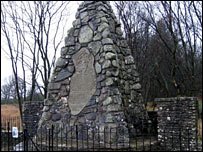A Historic Battlefield Imperiled by Power Company's Advance
 Fraser McRae, 61, of Montrose, Angus, wrote to the BBC News website about concerns that plans for new electricity pylons would desecrate an ancient battle ground.
Fraser McRae, 61, of Montrose, Angus, wrote to the BBC News website about concerns that plans for new electricity pylons would desecrate an ancient battle ground.Many members of the Clan MacRae were slaughtered in the battle of Sheriffmuir in 1715, at the end of the Jacobite uprising.
Mr McRae fears many of the dead which still lie on the battlefield could be disturbed if plans to build a major power line cut through the site.
The battle of Sheriffmuir, fought on 13 November 1715, is seen as the most significant and last battle of the rebellion.
On one side were the Jacobite forces, 10,000 troops led by the Earl of Mar, and on the other, the government forces under the Duke of Argyll, with about half that number. The battle was sparked when the Duke mobilised his forces from Stirling to block the road south to England, where Mar had decided to move his forces. Despite their greater numbers, the rebels were eventually forced to retreat to Perth and the MacRaes, sited on the left flank of the Jacobite army, were left exposed and, with no cavalry support, were effectively slaughtered.
Many of the men who died here still lie here after almost 300 years .
Now the Clan MacRae Society claims the site of the battle, which has been marked with a memorial, is under threat from plans by Scottish and Southern Energy to build a 137-mile power transmission line of pylons from Beauly, near Inverness, to Denny, near Falkirk.
The company has promised to make a fully informed decision on the route of the line and Mr McRae has echoed calls for a public inquiry into the proposals.
"We're not concerned with the pylon line itself, but its going to run directly through Sheriffmuir," he said. "The pylons will require foundations and that will mean digging huge holes right across the battlefield. Many of the men who died here still lie here after almost 300 years and we don't think it's acceptable that they should be disturbed at this time for this reason."
Mr McRae said battlefields in Scotland were not given the same level of protection as in England, a policy he hopes will also change.
About 100 MacRaes died in the battle, a considerable number for the small clan, which had its homeland in Kintail, Perthshire.
The losses caused a shortage of men within the clan which lasted for several generations.
Mr McRae said: "It has been suggested that a metal detector survey could be carried out to identify artefacts and human remains and any that are found be dug up under the supervision of an archaeologist. "We don't think it should be dug up at all."
The clan society, and others concerned by what may happen to the battlefield, have staged a number of protest marches in the area to raise awareness of the issue.
"We would like to see the pylons routed right round the battlefield with no disturbance to the ground and no disturbance to the remains of the men who have lain here for all that time," he said. "A lot of people don't know there was a battle here and a lot don't know what is planned here. A public inquiry will bring this to people's attention."


0 Comments:
Post a Comment
<< Home